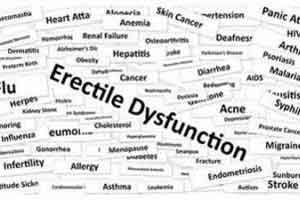- Home
- Editorial
- News
- Practice Guidelines
- Anesthesiology Guidelines
- Cancer Guidelines
- Cardiac Sciences Guidelines
- Critical Care Guidelines
- Dentistry Guidelines
- Dermatology Guidelines
- Diabetes and Endo Guidelines
- Diagnostics Guidelines
- ENT Guidelines
- Featured Practice Guidelines
- Gastroenterology Guidelines
- Geriatrics Guidelines
- Medicine Guidelines
- Nephrology Guidelines
- Neurosciences Guidelines
- Obs and Gynae Guidelines
- Ophthalmology Guidelines
- Orthopaedics Guidelines
- Paediatrics Guidelines
- Psychiatry Guidelines
- Pulmonology Guidelines
- Radiology Guidelines
- Surgery Guidelines
- Urology Guidelines
Erectile dysfunction is red flag for silent early cardiovascular disease

Despite decades-long prevention and treatment efforts, cardiovascular (CV) disease continues to be the leading cause of death worldwide. Early detection of CV disease can allow for interventions to prevent heart attack and stroke, including smoking cessation, medications such as statins, blood pressure control, weight management, exercise, and improved diet. A new study published online first today in the journal Vascular Medicine focuses on a novel risk factor for cardiovascular disease that rarely receives attention - erectile dysfunction.
In addition to being an important health and quality of life issue for men, erectile dysfunction has long been associated with CV disease. Risk factors for erectile dysfunction and CV disease are similar - including older age, smoking, obesity, and diabetes, among others. In addition, multiple overlapping mechanisms lead to the development of both erectile dysfunction and CV disease.
In the article entitled "The relationship of erectile dysfunction and subclinical cardiovascular disease: A systematic review and meta-analysis," Drs. Chukwuemeka Osondu (Baptist Health South Florida), Bryan Vo (Florida International University), Ehimen Aneni (Mount Sinai Medical Center), and colleagues sought to establish erectile dysfunction as a simple and effective marker of underlying subclinical CV disease. They hypothesized that "measures of erectile dysfunction could be a simple effective CV disease risk stratification tool, particularly in young men who are less likely to undergo aggressive CVD risk assessment and management."
The authors conducted a systematic review and meta-analysis of 28 studies that examined the link between erectile dysfunction and measures of early CV disease. They report a significant association of erectile dysfunction with impaired endothelial function (measured by brachial flow-mediated dilation using ultrasound), a marker of the ability of blood vessels to relax that is an early event in vascular disease development. In addition, the authors report that erectile dysfunction was associated with increased carotid intimal medial thickness (carotid IMT), an early manifestation of atherosclerosis. The results for the association of erectile dysfunction and coronary artery calcium scoring were inconclusive due to the small number of studies with limited sample size. The authors identify this as an area in need of future study.
As explained by the authors, "Our study findings indicate that [young] men [with erectile dysfunction] are at greater risk of having identifiable subclinical CV disease and will benefit from an active CV disease work-up...Our study supports a more aggressive CV disease risk assessment and management for persons with erectile dysfunction, including young men who may otherwise be categorized as low risk due to their young ages."
In an accompanying editorial, Drs. Naomi Hamburg and Matt Kluge (Boston University) agree: "The presence of erectile dysfunction portends a higher risk of future cardiovascular events, particularly in intermediate-risk men, and may serve as an opportunity for intensification of cardiovascular risk prevention strategies." They add "The findings add to the growing evidence supporting additional trials to determine the clinical impact of erectile dysfunction screening and the appropriate cardiovascular directed evaluation and treatment of men with erectile dysfunction."

Disclaimer: This site is primarily intended for healthcare professionals. Any content/information on this website does not replace the advice of medical and/or health professionals and should not be construed as medical/diagnostic advice/endorsement or prescription. Use of this site is subject to our terms of use, privacy policy, advertisement policy. © 2020 Minerva Medical Treatment Pvt Ltd